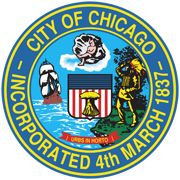CHICAGO — As the extreme cold takes hold, the Chicago Office of Emergency Management and Communications (OEMC), Department of Family and Support Services, Department of Public Health and other City departments are urging residents to take the necessary steps to stay warm and safe by utilizing City-offered services during cold and extreme temperatures. Those seeking access to warming centers and/or experiencing insufficient heat are encouraged to contact 3-1-1 for immediate assistance.
The National Weather Service has issued a Wind Chill Advisory for Chicago area from today at 6 p.m. through noon on Friday. A Wind Chill Advisory is issued when cold air and the wind will combine to create low wind chills. Frostbite and hypothermia can occur if precautions are not taken. Those heading outside for any length of time are advised to dress in layers and wear a hat and gloves. The low wind chills could cause frostbite on exposed skin in as little as 30 minutes.
“Chicago is no stranger to cold weather, but residents should still remain cautious and remember to take care of neighbors, family members, and friends,” said OEMC Acting Executive Director Rich Guidice. “Please remember to check our elderly and disabled residents, as well as those living alone. City departments are prepared to assist with emergency response, well-being checks, warming centers and other city services. By working together we can ensure every Chicagoan will have a warm, safe, and healthy winter season.”
OEMC urges residents to prepare for cold temperatures and snowy conditions throughout the winter by taking steps, such as keeping essentials in the households and cars, as well as maintaining good working order of vehicles. Residents should know the signs and care of frostbite and hypothermia and take action to treat conditions.
Warming Centers
The Department of Family and Support Services (DFSS) operates six Community Service Centers located throughout the city that double as warming centers on weekdays during the winter months when temperatures fall below 32 degrees. These Community Service Centers are open weekdays from 9:00 a.m. to 5:00 p.m. One of these facilities, the Garfield Community Service Center at 10 South Kedzie, is open on a 24-hour basis to connect residents to shelter. DFSS also operates the City’s six Regional Senior Centers and 15 Satellite Senior Centers where seniors can go to keep warm in addition to taking part in numerous activities.
On evenings, weekends or holidays, City-operated facilities including libraries, park facilities and police stations might also serve as warming centers if they are needed. 3-1-1 offers a range of services to assist some of Chicago’s most vulnerable residents, including shelter for homeless residents, warming centers and well-being checks. Seniors or individuals with limited mobility may also call 3-1-1 to request a ride to any of the centers.
Information and multilingual fliers containing warming center information in English, Spanish and Polish are posted on DFSS’s website and Facebook pages at www.cityofchicago.org/fss and www.facebook.com/chicagoDFSS.
Department of Public Health
The Chicago Department of Public Health reminds residents to take extra precautions to stay warm and avoid hypothermia and frostbite. Residents should avoid unnecessary trips outside, and if it is necessary to go outside, wear several loose fitting layers of warm clothing. When shoveling snow, work slowly and take frequent breaks to avoid exhaustion. Be sure to check in on family members, friends and neighbors.
Information for Homeowners, Renters
Residents should winterize your home and vehicles and keep cell phones charged for emergencies. Additional winter preparation information is available at www.alertchicago.com, including links to other local, state and federal resources.
The Chicago Department of Water Management encourages residents to make sure pipes are properly insulated and not exposed to freezing air. This includes pipes in garages and unheated areas of the home. If pipes do freeze, do not use candles or any open flame to thaw them; instead, use a hair dryer or heating pad.
The Chicago Heat Ordinance mandates that landlords supply heat to rental units during cold weather months. From September 15 to June 1, the temperature inside a rental residence must be at least 68 degrees during the day. During the evening, the temperatures must be at least 66 degrees. The Department of Buildings encourages residents to first contact their landlords when these temperatures are not maintained and to call 3-1-1 if no action is being taken. During extreme cold weather, however, the Building Department’s first priority is responding to heat complaints and it reassigns inspectors to handle the increased number of heat complaints.
The Chicago Fire Department does not recommend using space heaters; however, if used, be sure they are UL certified and at least 3 feet from anything that can ignite. Use of a space heater in children’s rooms should be monitored closely as children sometimes move them close to or into the bed with tragic results. If extension cords are used, they should be rated at 15 amps minimum and never put cords under carpet.
It is advised that residents and businesses prepare by having regular inspection and servicing of the boiler/furnace to ensure it is running safely and efficiently, as well as keeping the area around natural gas appliances clutter free to avoid a fire hazard. Never store flammables near a furnace, ensure natural gas appliances are correctly flued and have the correct ventilation to avoid carbon monoxide (CO) to build up in living areas. When lit, make sure the flames are blue; a yellow flame could indicate the presence of CO. Understand the dangers and symptoms of carbon monoxide and have CO detectors installed and test regularly.
OEMC reminds residents to sign up for Smart911 at www.Smart911.com or download the mobile app at Apple Store or Google Play to give 9-1-1 information to assist in an emergency.
###
